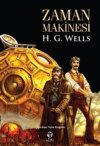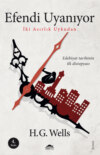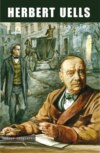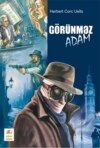Kitabı oku: «Mr. Britling Sees It Through », sayfa 11
§ 5
After Hugh had cleared things up and gone back to London Mr. Britling was inclined to think that such a thing as apprehension was a sin against the general fairness and integrity of life.
Of all things in the world Hugh was the one that could most easily rouse Mr. Britling's unhappy aptitude for distressing imaginations. Hugh was nearer by far to his heart and nerves than any other creature. In the last few years Mr. Britling, by the light of a variety of emotional excursions in other directions, had been discovering this. Whatever Mr. Britling discovered he talked about; he had evolved from his realisation of this tenderness, which was without an effort so much tenderer than all the subtle and tremendous feelings he had attempted in his – excursions, the theory that he had expounded to Mr. Direck that it is only through our children that we are able to achieve disinterested love, real love. But that left unexplained that far more intimate emotional hold of Hugh than of his very jolly little step-brothers. That was a fact into which Mr. Britling rather sedulously wouldn't look…
Mr. Britling was probably much franker and more open-eyed with himself and the universe than a great number of intelligent people, and yet there were quite a number of aspects of his relations with his wife, with people about him, with his country and God and the nature of things, upon which he turned his back with an attentive persistence. But a back too resolutely turned may be as indicative as a pointing finger, and in this retrogressive way, and tacitly even so far as his formal thoughts, his unspoken comments, went, Mr. Britling knew that he loved his son because he had lavished the most hope and the most imagination upon him, because he was the one living continuation of that dear life with Mary, so lovingly stormy at the time, so fine now in memory, that had really possessed the whole heart of Mr. Britling. The boy had been the joy and marvel of the young parents; it was incredible to them that there had ever been a creature so delicate and sweet, and they brought considerable imagination and humour to the detailed study of his minute personality and to the forecasting of his future. Mr. Britling's mind blossomed with wonderful schemes for his education. All that mental growth no doubt contributed greatly to Mr. Britling's peculiar affection, and with it there interwove still tenderer and subtler elements, for the boy had a score of Mary's traits. But there were other things still more conspicuously ignored. One silent factor in the slow widening of the breach between Edith and Mr. Britling was her cool estimate of her stepson. She was steadfastly kind to this shock-headed, untidy little dreamer, he was extremely well cared for in her hands, she liked him and she was amused by him – it is difficult to imagine what more Mr. Britling could have expected – but it was as plain as daylight that she felt that this was not the child she would have cared to have borne. It was quite preposterous and perfectly natural that this should seem to Mr. Britling to be unfair to Hugh.
Edith's home was more prosperous than Mary's; she brought her own money to it; the bringing up of her children was a far more efficient business than Mary's instinctive proceedings. Hugh had very nearly died in his first year of life; some summer infection had snatched at him; that had tied him to his father's heart by a knot of fear; but no infection had ever come near Edith's own nursery. And it was Hugh that Mr. Britling had seen, small and green-faced and pitiful under an anaesthetic for some necessary small operation to his adenoids. His younger children had never stabbed to Mr. Britling's heart with any such pitifulness; they were not so thin-skinned as their elder brother, not so assailable by the little animosities of dust and germ. And out of such things as this evolved a shapeless cloud of championship for Hugh. Jealousies and suspicions are latent in every human relationship. We go about the affairs of life pretending magnificently that they are not so, pretending to the generosities we desire. And in all step-relationships jealousy and suspicion are not merely latent, they stir.
It was Mr. Britling's case for Hugh that he was something exceptional, something exceptionally good, and that the peculiar need there was to take care of him was due to a delicacy of nerve and fibre that was ultimately a virtue. The boy was quick, quick to hear, quick to move, very accurate in his swift way, he talked unusually soon, he began to sketch at an early age with an incurable roughness and a remarkable expressiveness. That he was sometimes ungainly, often untidy, that he would become so mentally preoccupied as to be uncivil to people about him, that he caught any malaise that was going, was all a part of that. The sense of Mrs. Britling's unexpressed criticisms, the implied contrasts with the very jolly, very uninspired younger family, kept up a nervous desire in Mr. Britling for evidences and manifestations of Hugh's quality. Not always with happy results; it caused much mutual irritation, but not enough to prevent the growth of a real response on Hugh's part to his father's solicitude. The youngster knew and felt that his father was his father just as certainly as he felt that Mrs. Britling was not his mother. To his father he brought his successes and to his father he appealed.
But he brought his successes more readily than he brought his troubles. So far as he himself was concerned he was disposed to take a humorous view of the things that went wrong and didn't come off with him, but as a "Tremendous Set-Down for the Proud Parent" they resisted humorous treatment…
Now the trouble that he had been hesitating to bring before his father was concerned with that very grave interest of the young, his Object in Life. It had nothing to do with those erotic disturbances that had distressed his father's imagination. Whatever was going on below the surface of Hugh's smiling or thoughtful presence in that respect had still to come to the surface and find expression. But he was bothered very much by divergent strands in his own intellectual composition. Two sets of interests pulled at him, one – it will seem a dry interest to many readers, but for Hugh it glittered and fascinated – was crystallography and molecular physics; the other was caricature. Both aptitudes sprang no doubt from the same exceptional sensitiveness to form. As a schoolboy he exercised both very happily, but now he was getting to the age of specialisation, and he was fluctuating very much between science and art. After a spell of scientific study he would come upon a fatigue period and find nothing in life but absurdities and a lark that one could represent very amusingly; after a bout of funny drawings his mind went back to his light and crystals and films like a Magdalen repenting in a church. After his public school he had refused Cambridge and gone to University College, London, to work under the great and inspiring Professor Cardinal; simultaneously Cardinal had been arranging to go to Cambridge, and Hugh had scarcely embarked upon his London work when Cardinal was succeeded by the dull, conscientious and depressing Pelkingham, at whose touch crystals became as puddings, bubble films like cotton sheets, transparency vanished from the world, and X rays dwarfed and died. And Hugh degenerated immediately into a scoffing trifler who wished to give up science for art.
He gave up science for art after grave consultation with his father, and the real trouble that had been fretting him, it seemed, was that now he repented and wanted to follow Cardinal to Cambridge, and – a year lost – go on with science again. He felt it was a discreditable fluctuation; he knew it would be a considerable expense; and so he took two weeks before he could screw himself up to broaching the matter.
"So that is all," said Mr. Britling, immensely relieved.
"My dear Parent, you didn't think I had backed a bill or forged a cheque?"
"I thought you might have married a chorus girl or something of that sort," said Mr. Britling.
"Or bought a large cream-coloured motor-car for her on the instalment system, which she'd smashed up. No, that sort of thing comes later… I'll just put myself down on the waiting list of one of those bits of delight in the Cambridge tobacco shops – and go on with my studies for a year or two…"
§ 6
Though Mr. Britling's anxiety about his son was dispelled, his mind remained curiously apprehensive throughout July. He had a feeling that things were not going well with the world, a feeling he tried in vain to dispel by various distractions. Perhaps some subtler subconscious analysis of the situation was working out probabilities that his conscious self would not face. And when presently he bicycled off to Mrs. Harrowdean for flattery, amusement, and comfort generally, he found her by no means the exalting confirmation of everything he wished to believe about himself and the universe, that had been her delightful rôle in the early stages of their romantic friendship. She maintained her hostility to Edith; she seemed bent on making things impossible. And yet there were one or two phases of the old sustaining intimacies.
They walked across her absurd little park to the summer-house with the view on the afternoon of his arrival, and they discussed the Irish pamphlet which was now nearly finished.
"Of course," she said, "it will be a wonderful pamphlet."
There was a reservation in her voice that made him wait.
"But I suppose all sorts of people could write an Irish pamphlet. Nobody but you could write 'The Silent Places.' Oh, why don't you finish that great beautiful thing, and leave all this world of reality and newspapers, all these Crude, Vulgar, Quarrelsome, Jarring things to other people? You have the magic gift, you might be a poet, you can take us out of all these horrid things that are, away to Beautyland, and you are just content to be a critic and a disputer. It's your surroundings. It's your sordid realities. It's that Practicality at your elbow. You ought never to see a newspaper. You ought never to have an American come within ten miles of you. You ought to live on bowls of milk drunk in valleys of asphodel."
Mr. Britling, who liked this sort of thing in a way, and yet at the same time felt ridiculously distended and altogether preposterous while it was going on, answered feebly and self-consciously.
"There was your letter in the Nation the other day," she said. "Why do you get drawn into arguments? I wanted to rush into the Nation and pick you up and wipe the anger off you, and carry you out of it all – into some quiet beautiful place."
"But one has to answer these people," said Mr. Britling, rolling along by the side of her like a full moon beside Venus, and quite artlessly falling in with the tone of her.
She repeated lines from "The Silent Places" from memory. She threw quite wonderful emotion into her voice. She made the words glow. And he had only shown her the thing once…
Was he indeed burying a marvellous gift under the dust of current affairs? When at last in the warm evening light they strolled back from the summer-house to dinner he had definitely promised her that he would take up and finish "The Silent Places."… And think over the Irish pamphlet again before he published it…
Pyecrafts was like a crystal casket of finer soil withdrawn from the tarred highways of the earth…
And yet the very next day this angel enemy of controversies broke out in the most abominable way about Edith, and he had to tell her more plainly than he had done hitherto, that he could not tolerate that sort of thing. He wouldn't have Edith guyed. He wouldn't have Edith made to seem base. And at that there was much trouble between them, and tears and talk of Oliver…
Mr. Britling found himself unable to get on either with "The Silent Places" or the pamphlet, and he was very unhappy…
Afterwards she repented very touchingly, and said that if only he would love her she would swallow a thousand Ediths. He waived a certain disrespect in the idea of her swallowing Edith, and they had a beautiful reconciliation and talked of exalted things, and in the evening he worked quite well upon "The Silent Places" and thought of half-a-dozen quite wonderful lines, and in the course of the next day he returned to Dower House and Mr. Direck and considerable piles of correspondence and the completion of the Irish pamphlet.
But he was restless. He was more restless in his house than he had ever been. He could not understand it. Everything about him was just as it had always been, and yet it was unsatisfactory, and it seemed more unstable than anything had ever seemed before. He was bored by the solemn development of the Irish dispute; he was irritated by the smouldering threat of the Balkans; he was irritated by the suffragettes and by a string of irrational little strikes; by the general absence of any main plot as it were to hold all these wranglings and trivialities together… At the Dower House the most unpleasant thoughts would come to him. He even had doubts whether in "The Silent Places," he had been plagiarising, more or less unconsciously, from Henry James's "Great Good Place."…
On the twenty-first of July Gladys came back repaired and looking none the worse for her misadventure. Next day he drove her very carefully over to Pyecrafts, hoping to drug his uneasiness with the pretence of a grand passion and the praises of "The Silent Places," that beautiful work of art that was so free from any taint of application, and alas! he found Mrs. Harrowdean in an evil mood. He had been away from her for ten days – ten whole days. No doubt Edith had manoeuvred to keep him. She hadn't! Hadn't she? How was he, poor simple soul! to tell that she hadn't? That was the prelude to a stormy afternoon.
The burthen of Mrs. Harrowdean was that she was wasting her life, that she was wasting the poor, good, patient Oliver's life, that for the sake of friendship she was braving the worst imputations and that he treated her cavalierly, came when he wished to do so, stayed away heartlessly, never thought she needed little treats, little attentions, little presents. Did he think she could settle down to her poor work, such as it was, in neglect and loneliness? He forgot women were dear little tender things, and had to be made happy and kept happy. Oliver might not be clever and attractive but he did at least in his clumsy way understand and try and do his duty…
Towards the end of the second hour of such complaints the spirit of Mr. Britling rose in revolt. He lifted up his voice against her, he charged his voice with indignant sorrow and declared that he had come over to Pyecrafts with no thought in his mind but sweet and loving thoughts, that he had but waited for Gladys to be ready before he came, that he had brought over the manuscript of "The Silent Places" with him to polish and finish up, that "for days and days" he had been longing to do this in the atmosphere of the dear old summer-house with its distant view of the dear old sea, and that now all that was impossible, that Mrs. Harrowdean had made it impossible and that indeed she was rapidly making everything impossible…
And having delivered himself of this judgment Mr. Britling, a little surprised at the rapid vigour of his anger, once he had let it loose, came suddenly to an end of his words, made a renunciatory gesture with his arms, and as if struck with the idea, rushed out of her room and out of the house to where Gladys stood waiting. He got into her and started her up, and after some trouble with the gear due to the violence of his emotion, he turned her round and departed with her – crushing the corner of a small bed of snapdragon as he turned – and dove her with a sulky sedulousness back to the Dower House and newspapers and correspondence and irritations, and that gnawing and irrational sense of a hollow and aimless quality in the world that he had hoped Mrs. Harrowdean would assuage. And the further he went from Mrs. Harrowdean the harsher and unjuster it seemed to him that he had been to her.
But he went on because he did not see how he could very well go back.
§ 7
Mr. Direck's broken wrist healed sooner than he desired. From the first he had protested that it was the sort of thing that one can carry about in a sling, that he was quite capable of travelling about and taking care of himself in hotels, that he was only staying on at Matching's Easy because he just loved to stay on and wallow in Mrs. Britling's kindness and Mr. Britling's company. While as a matter of fact he wallowed as much as he could in the freshness and friendliness of Miss Cecily Corner, and for more than a third of this period Mr. Britling was away from home altogether.
Mr. Direck, it should be clear by this time, was a man of more than European simplicity and directness, and his intentions towards the young lady were as simple and direct and altogether honest as such intentions can be. It is the American conception of gallantry more than any other people's, to let the lady call the tune in these affairs; the man's place is to be protective, propitiatory, accommodating and clever, and the lady's to be difficult but delightful until he catches her and houses her splendidly and gives her a surprising lot of pocket-money, and goes about his business; and upon these assumptions Mr. Direck went to work. But quite early it was manifest to him that Cecily did not recognise his assumptions. She was embarrassed when he got down one or two little presents of chocolates and flowers for her from London – the Britling boys were much more appreciative – she wouldn't let him contrive costly little expeditions for her, and she protested against compliments and declared she would stay away when he paid them. And she was not contented by his general sentiments about life, but asked the most direct questions about his occupation and his activities. His chief occupation was being the well provided heir of a capable lawyer, and his activities in the light of her inquiries struck him as being light and a trifle amateurish, qualities he had never felt as any drawback about them before. So that he had to rely rather upon aspirations and the possibility, under proper inspiration, of a more actively serviceable life in future.
"There's a feeling in the States," he said, "that we've had rather a tendency to overdo work, and that there is scope for a leisure class to develop the refinement and the wider meanings of life."
"But a leisure class doesn't mean a class that does nothing," said Cecily. "It only means a class that isn't busy in business."
"You're too hard on me," said Mr. Direck with that quiet smile of his.
And then by way of putting her on the defensive he asked her what she thought a man in his position ought to do.
"Something," she said, and in the expansion of this vague demand they touched on a number of things. She said that she was a Socialist, and there was still in Mr. Direck's composition a streak of the old-fashioned American prejudice against the word. He associated Socialists with Anarchists and deported aliens. It was manifest too that she was deeply read in the essays and dissertations of Mr. Britling. She thought everybody, man or woman, ought to be chiefly engaged in doing something definite for the world at large. ("There's my secretaryship of the Massachusetts Modern Thought Society, anyhow," said Mr. Direck.) And she herself wanted to be doing something – it was just because she did not know what it was she ought to be doing that she was reading so extensively and voraciously. She wanted to lose herself in something. Deep in the being of Mr. Direck was the conviction that what she ought to be doing was making love in a rapturously egotistical manner, and enjoying every scrap of her own delightful self and her own delightful vitality – while she had it, but for the purposes of their conversation he did not care to put it any more definitely than to say that he thought we owed it to ourselves to develop our personalities. Upon which she joined issue with great vigour.
"That is just what Mr. Britling says about you in his 'American Impressions,'" she said. "He says that America overdoes the development of personalities altogether, that whatever else is wrong about America that is where America is most clearly wrong. I read that this morning, and directly I read it I thought, 'Yes, that's exactly it! Mr. Direck is overdoing the development of personalities.'"
"Me!"
"Yes. I like talking to you and I don't like talking to you. And I see now it is because you keep on talking of my Personality and your Personality. That makes me uncomfortable. It's like having some one following me about with a limelight. And in a sort of way I do like it. I like it and I'm flattered by it, and then I go off and dislike it, dislike the effect of it. I find myself trying to be what you have told me I am – sort of acting myself. I want to glance at looking-glasses to see if I am keeping it up. It's just exactly what Mr. Britling says in his book about American women. They act themselves, he says; they get a kind of story and explanation about themselves and they are always trying to make it perfectly plain and clear to every one. Well, when you do that you can't think nicely of other things."
"We like a clear light on people," said Mr. Direck.
"We don't. I suppose we're shadier," said Cecily.
"You're certainly much more in half-tones," said Mr. Direck. "And I confess it's the half-tones get hold of me. But still you haven't told me, Miss Cissie, what you think I ought to do with myself. Here I am, you see, very much at your disposal. What sort of business do you think it's my duty to go in for?"
"That's for some one with more experience than I have, to tell you. You should ask Mr. Britling."
"I'd rather have it from you."
"I don't even know for myself," she said.
"So why shouldn't we start to find out together?" he asked.
It was her tantalising habit to ignore all such tentatives.
"One can't help the feeling that one is in the world for something more than oneself," she said…










